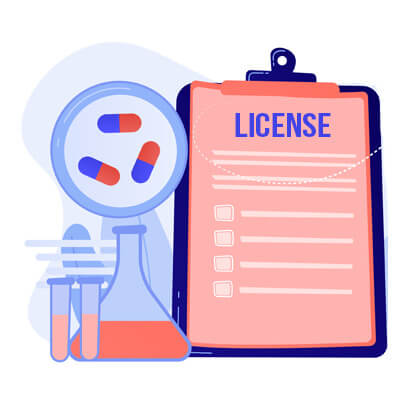

Drug licenses are very crucial to run drug businesses due to several reasons, such as safety and quality control, public health protection, regulatory compliance, accountability, traceability, control of controlled substances, consumer protection, and much more. It contributes to public health protection, consumer confidence, and the integrity of the pharmaceutical industry. Drug licenses serve as a regulatory mechanism to ensure compliance with quality standards, ethical practices, and legal requirements, in the pharma sector. Drugs License Registration play an important role in protecting public health, ensuring the safety and quality of drugs. In this blog, we mention: What are the types of drug businesses that require a drug license?
All the manufacturers and suppliers who are dealing with ayurvedics, cosmetics, allopathic medicines, etc would need different types of drug licenses. As specified under the Drugs and Cosmetics Act 1940, it is necessary to obtain a Manufacturing Drug License. Moreover, it is a state license and is issued by the respective state government where the manufacturing unit is located. Aside from this, if a drug business entity has operating units in two states or more states, it needs to obtain a separate drug license for each state.
1. Pharmaceutical Manufacturers
Companies that are engaged in the manufacturing of drugs, including sterile products, pharmaceutical formulations, biological products, and active pharmaceutical ingredients, generally need a drug license to operate legally and comply with regulations. This license ensures compliance with quality standards, safety regulations, and good manufacturing practices. Moreover, drug licenses are very crucial for running drug businesses; it involve pharmaceutical manufacturers, usually require for import and exporting, and distribution activities, and may require a specific license for conducting clinical trials, research studies, or experimentation with investigational drugs.
2. Wholesale Drugs Distributors License
Businesses that are involved in the wholesale distribution of drugs primarily need a drug license to legally operate in the pharmaceutical supply chain network. These companies purchase drugs directly from manufacturers and sell them to pharmacies, hospitals, retailers, clinics, and other healthcare institutions in bulk quantities, which ensures adherence to distribution guidelines, instructions, and quality control measures. Moreover, the license is granted after an evaluation of the distributor's facilities, storage conditions, quality control systems, and adherence to Good Distribution Practices (GDP) or similar standards.
3. Retail Pharmacies
Retail pharmacies, usually known as community pharmacies or drugstores, may need particular drug licenses in order to lawfully dispense prescription and OTC medications to the general public. They often need a drug license and sell both prescription and over-the-counter medications to the general public. This license guarantees adherence to laws governing the dispensing, labeling, handling, and keeping of records for pharmaceutical items. A drug license is given following a review of the pharmacy's physical attributes, adherence to Good Pharmacy Practice (GPP) or comparable standards, and fulfillment of particular standards pertaining to drug distribution.
4. Clinical Research Organizations
On behalf of pharmaceutical firms or other sponsors, CROs carry out the clinical trials and research projects required for drug licenses. To handle investigational pharmaceuticals and guarantee compliance with rules regarding the conduct of clinical studies, it is most necessary to get a drug license. To ensure compliance with rules governing the conduct of clinical research, including participant safety, data collection, ethical concerns, and reporting requirements, pharma businesses need a drug license.
5. Compounding Pharmacies
Due to the intricacy and potential hazards associated with the compounding process, compounding pharmacies typically need a drug license. Pharmacy compounding is focused To fulfill the needs of individual patients, specialised pharmacies create custom drug combinations or modify already-existing pharmaceutical items. Similar to retail pharmacies, compounding pharmacies are required to get a pharmacy license in order to conduct business and distribute medication. These drug business licenses guarantee adherence to rules and legislation governing the compounding, handling, storage, and dispensing of medications.





We are the pioneers in offering environmental consulting services to our patrons, giving us the first mover advantage & keeping us ahead of our competitors.
Very experienced in filing, monitoring & submission of CDSCO Compliances, Drugs Manufacturing & sale guidelines, Environmental Impact Assessment, AERB consulting services, Pollution Control Board CTE & CTO Advisory Services, Waste Management Authorization from State Pollution Control Boards, Fertilizers & Insecticides Manufacturing, Wholesale & Import Compliances
